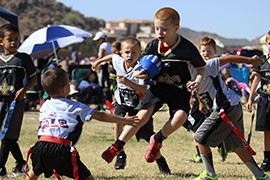Cronkite News has moved to a new home at cronkitenews.azpbs.org. Use this site to search archives from 2011 to May 2015. You can search the new site for current stories.
Flag football proving an alternative to tackle football concussion fears
Youth participation in flag football, basketball and soccer is on the rise in Mesa and elsewhere.
Coincidence? Or is increased awareness of concussions in football the primary cause? A 2014 study by Neurology.org showed that former NFL players who were exposed to tackle football before the age of 12 had greater cognitive impairment at a later age than those who were exposed after the age of 12.
“Right now, with today’s technology, to be honest with a parent I would have to tell them that if they are afraid of their son getting a concussion or a head injury, the risk is still there, despite all of these safeguards,” said Roger McCoy, team physician at Arizona State University. “There is no helmet that will protect you from a concussion. I would just give them all of that information and be honest with them about what we know today.”
Not surprisingly, parents are searching for alternatives, like flag football.
James Smith, a program director in Arizona for youth sports organization i9 Sports, said he has seen his flag football program grow in recent years. Numbers aren’t just going up in flag football. In Mesa, recreational programmer for the city Lacy Bienkowski has seen enrollment numbers go up in a number of her programs.
Bienkowski and Smith both hear concerns from parents over tackle football, leading some to remove their children from the sport.
“I do get parents who tell me, ‘Hey, I want my kid to play basketball, I don’t even want to do flag, I don’t want him to like football,’” Smith said.
Smith, however, doesn’t play off fear to promote his league.
“I’m going to promote my league versus fear. If that was the case everybody would be driving around in a Volvo or a Mercedes. If that was an overriding thing, then you would just go buy the safest car out there,” Smith said. “A restaurant doesn’t put up a sign, ‘Hey, the guy next door just got food poisoning.’”
Both program directors agree awareness and education are the keys to the future. The city of Mesa created the Positive Play Project, an educational resource Bienkowski believes has helped the city stay on top of the concussion issue.
“We took a huge step, back in the fall of 2013, we started the Positive Play Project, which is all about wellness and development in youth sports. All of our coaches go through this training once a year, and they get training from A.T. Still University on concussions,” Bienkowski said.
There are still no guarantees young players are safe from all injury risks, even in flag football.
“It gets them out of the house,’’ Smith said. “It’s a great sport as far as physical activity. I even tell parents, ‘Your kid may run into another kid.’ They’re 8, 9, they are clumsy kids.
“I think the only thing we can do is promote our league, promote our safety, promote how we train our coaches, promote how we elevate the concussion as in we have a concussion policy, a safety policy a practice policy. So then the parent can understand they’re not just going to let my kid going out here and bang heads every single day.”










